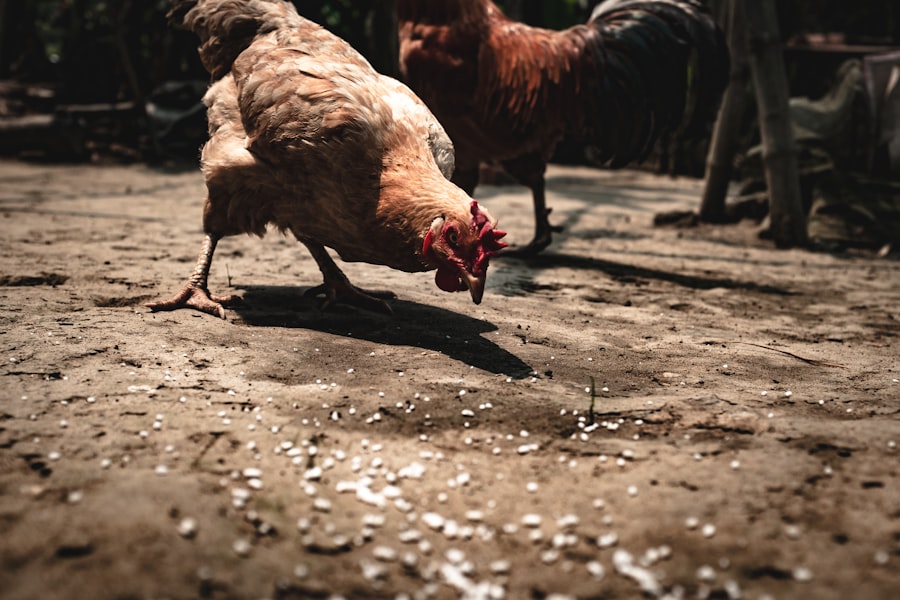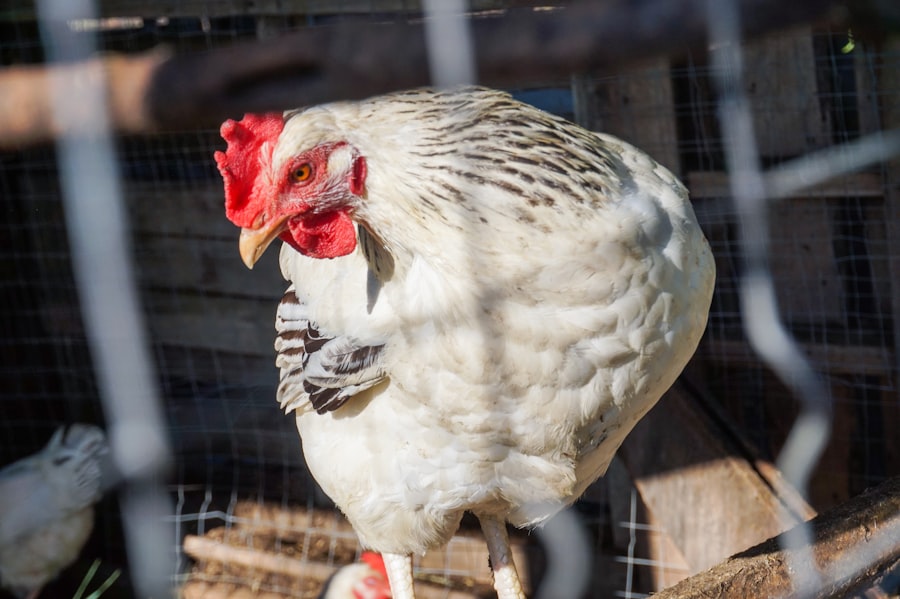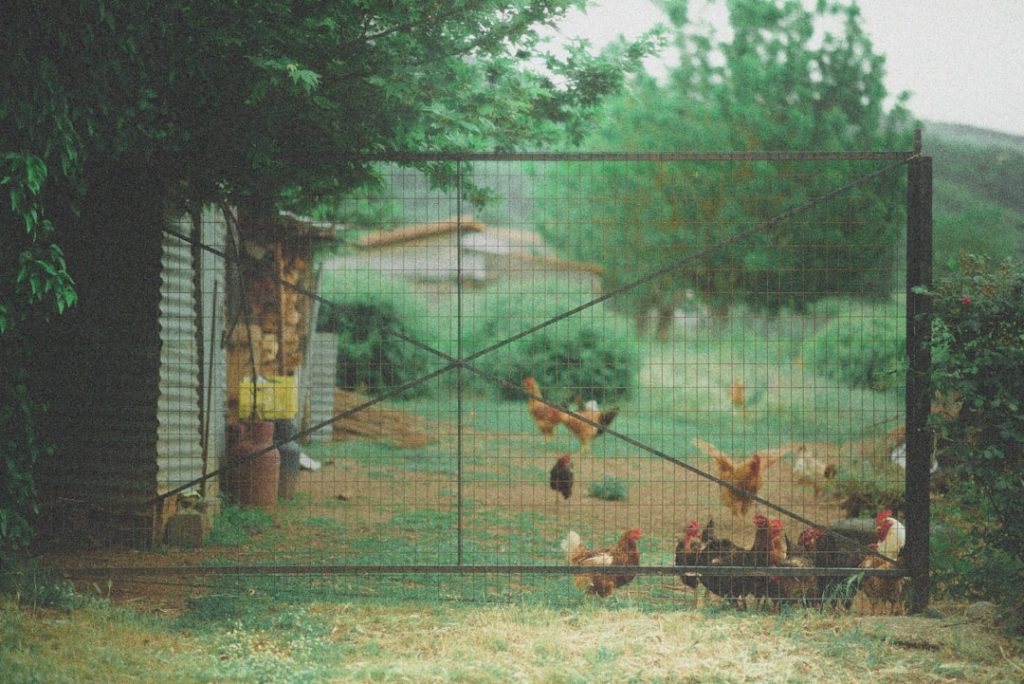Chickens are social animals that thrive in a flock environment. They have a natural pecking order, with dominant and submissive individuals. Understanding this behavior is crucial for creating a harmonious coop environment.
Chickens also have a strong instinct to forage for food, scratch the ground, and take dust baths. Providing opportunities for these natural behaviors can help reduce stress and promote overall well-being. Additionally, chickens are sensitive to changes in their environment and can become easily stressed by loud noises, sudden movements, or unfamiliar objects.
Being aware of these sensitivities can help you create a calm and secure environment for your flock. Chickens also have a strong sense of routine and can become distressed if their daily schedule is disrupted. They are most active during the day and prefer to roost at night.
Understanding their natural rhythms can help you establish a routine that meets their needs and reduces stress. Furthermore, chickens are highly social animals and form strong bonds with their flock mates. They communicate through a variety of vocalizations and body language, and they rely on each other for companionship and protection.
Understanding these social dynamics can help you create a coop environment that promotes positive interactions and reduces the risk of aggression or bullying within the flock.
Table of Contents
- 1 Creating a secure and comfortable coop
- 2 Providing adequate food and water
- 3 Regularly checking for escape routes
- 4 Using fencing and barriers
- 5 Training and socializing your chickens
- 6 Supervising free-range time
- 7 FAQs
- 7.1 What are some common reasons why chickens wander away?
- 7.2 How can I prevent my chickens from wandering away?
- 7.3 What are some effective ways to keep chickens contained in a specific area?
- 7.4 Are there any natural deterrents to keep chickens from wandering away?
- 7.5 What should I do if my chickens do wander away?
Key Takeaways
- Chickens have natural behaviors such as scratching, dust bathing, and roosting that should be accommodated in their living environment.
- A secure coop with proper ventilation, nesting boxes, and perches is essential for the safety and comfort of chickens.
- Providing a balanced diet and access to clean water is crucial for the health and well-being of chickens.
- Regularly inspecting the coop for any potential escape routes or weak spots in the structure is important for preventing predators from getting in.
- Using fencing and barriers can help keep chickens safe from predators and prevent them from wandering into unsafe areas.
Creating a secure and comfortable coop
Space and Ventilation
The coop should provide adequate space for the number of chickens in your flock. Overcrowding can lead to stress, aggression, and an increased risk of disease. The coop should also be well-ventilated to ensure good air quality and prevent the buildup of ammonia from chicken droppings.
Insulation and Comfort
The coop should be insulated to provide protection from extreme temperatures and drafts. The flooring of the coop should be covered with a layer of bedding, such as straw or wood shavings, to provide a comfortable surface for the chickens to walk and roost on.
Predator-Proofing and Enrichment
Nesting boxes should also be provided to give the hens a private and secure space to lay their eggs. The coop should be predator-proof, with secure latches on doors and windows, and wire mesh covering any openings to prevent access by predators such as foxes, raccoons, or birds of prey. Finally, providing perches and roosts at different heights within the coop can give the chickens opportunities to exercise and establish their pecking order.
Providing adequate food and water

Proper nutrition is essential for the health and well-being of your chickens. A balanced diet should include a combination of commercial chicken feed, grains, fruits, vegetables, and access to insects and other protein sources. It’s important to provide fresh water at all times, as chickens can quickly become dehydrated, especially in hot weather.
The water should be kept clean and free from contaminants to prevent the spread of disease. In addition to providing food and water inside the coop, it’s also important to offer opportunities for foraging and scratching outside. This can be achieved by providing access to a secure outdoor run or allowing supervised free-range time in a fenced area.
Foraging not only provides physical exercise but also mental stimulation for the chickens. It’s important to monitor their food intake and adjust their diet as needed based on their age, breed, and activity level. Providing a balanced diet will help ensure that your chickens stay healthy and productive.
Regularly checking for escape routes
Chickens are curious creatures that will often try to find ways to escape from their coop or run. Regularly checking for escape routes is essential for preventing your chickens from wandering into unsafe areas or becoming prey to predators. Inspect the perimeter of the coop and run for any gaps or weak spots in the fencing that could allow chickens to squeeze through or predators to gain access.
Check for loose boards, gaps under doors, or holes in the wire mesh that need to be repaired. It’s also important to inspect the coop itself for any potential escape routes. Look for gaps in the walls or roof where predators could gain access or where chickens could potentially fly out.
Additionally, check that all doors and windows are securely latched to prevent any accidental escapes. By regularly checking for escape routes, you can ensure that your chickens remain safe and secure within their designated area.
Using fencing and barriers
Fencing and barriers are essential for creating a safe and secure outdoor space for your chickens. The type of fencing you choose will depend on your specific needs and the predators in your area. Chicken wire is a popular choice for enclosing a run, as it provides good visibility while keeping predators out.
However, it’s important to bury the bottom edge of the wire or use an apron of wire mesh to prevent predators from digging underneath. Electric fencing can also be an effective deterrent for predators such as foxes or raccoons. It delivers a mild shock when touched, which can discourage predators from attempting to breach the enclosure.
Additionally, using barriers such as netting or covers over the top of the run can provide extra protection from aerial predators such as hawks or owls. It’s important to regularly inspect the fencing and barriers for any damage or wear and tear that could compromise their effectiveness. Repair any holes or weak spots promptly to ensure that your chickens remain safe from predators.

Building Trust and Reducing Stress
Spend time with your chickens daily, talking to them in a calm voice and offering treats from your hand. This will help them associate you with positive experiences and become more trusting of your presence. As a result, they will be more comfortable around humans and other animals, reducing stress and aggression within the flock.
Handling and Introducing New Chickens
Handling your chickens gently from a young age can make them more comfortable with human interaction. This will make it easier to perform health checks, administer medication, or move them to different areas when needed. Additionally, introducing new chickens to the flock gradually can help reduce aggression and establish a harmonious pecking order.
Creating a Harmonious Environment
Providing opportunities for social interaction within the flock is essential for reducing stress and promoting positive behavior. You can achieve this by providing multiple feeding stations, perches at different heights, and ample space for the chickens to move around without feeling crowded. By training and socializing your chickens, you can create a calm and harmonious environment that promotes their overall well-being.
Supervising free-range time
Allowing your chickens supervised free-range time can provide them with opportunities for exercise, foraging, and social interaction outside of their coop or run. However, it’s important to supervise this time to ensure their safety and prevent them from wandering into unsafe areas or becoming prey to predators. Before allowing your chickens free-range time, inspect the area for any potential hazards such as toxic plants, sharp objects, or areas where they could become trapped or injured.
Keep an eye on your chickens while they are outside, watching for any signs of distress or potential threats from predators. It’s also important to establish a routine for free-range time to help your chickens feel secure and reduce stress. By supervising their free-range time, you can ensure that they have positive experiences outside of their coop while remaining safe from harm.
In conclusion, understanding the behavior of chickens is essential for creating a secure and comfortable environment that meets their physical and psychological needs. By providing adequate food and water, regularly checking for escape routes, using fencing and barriers, training and socializing your chickens, and supervising their free-range time, you can create a safe and enriching environment that promotes their overall well-being.
If you’re looking for tips on how to keep chickens from wandering away, you might also be interested in this article on renting a chicken coop. This can provide a safe and secure environment for your chickens, reducing the likelihood of them wandering off.
FAQs
What are some common reasons why chickens wander away?
Chickens may wander away due to boredom, lack of food or water, seeking out a better nesting area, or simply following their natural instincts to forage for food.
How can I prevent my chickens from wandering away?
To prevent chickens from wandering away, ensure they have access to a secure and spacious coop, provide them with plenty of food and water, and offer enrichment activities such as dust baths and perches. Regularly checking for any gaps or weak spots in the fencing can also help prevent escapes.
What are some effective ways to keep chickens contained in a specific area?
Using a sturdy and well-maintained fence, installing an electric poultry netting, or using chicken wire to create a secure enclosure are all effective ways to keep chickens contained in a specific area. Additionally, providing regular supervision and training can help reinforce boundaries.
Are there any natural deterrents to keep chickens from wandering away?
Some natural deterrents to keep chickens from wandering away include planting dense shrubs or bushes around the perimeter of the coop, using predator decoys, and allowing the chickens access to a larger grazing area to satisfy their natural foraging instincts.
What should I do if my chickens do wander away?
If your chickens do wander away, it’s important to act quickly to locate and retrieve them. Conduct a thorough search of the surrounding area, ask neighbors if they have seen the chickens, and consider using treats or familiar calls to lure them back. Additionally, consider using a tracking device or ID tags to help locate lost chickens.
Meet Walter, the feathered-friend fanatic of Florida! Nestled in the sunshine state, Walter struts through life with his feathered companions, clucking his way to happiness. With a coop that’s fancier than a five-star hotel, he’s the Don Juan of the chicken world. When he’s not teaching his hens to do the cha-cha, you’ll find him in a heated debate with his prized rooster, Sir Clucks-a-Lot. Walter’s poultry passion is no yolk; he’s the sunny-side-up guy you never knew you needed in your flock of friends!







